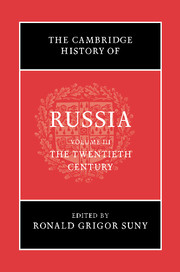Book contents
- Frontmatter
- Introduction
- 1 Reading Russia and the Soviet Union in the twentieth century: how the ‘West’ wrote its history of the USSR
- Part I Russia and the Soviet Union: The Story through Time
- 2 Russia’s fin de siècle, 1900–1914
- 3 The First World War, 1914–1918
- 4 The revolutions of 1917–1918
- 5 The Russian civil war, 1917–1922
- 6 Building a new state and society: NEP, 1921–1928
- 7 Stalinism, 1928–1940
- 8 Patriotic War, 1941–1945
- 9 Stalin and his circle
- 10 The Khrushchev period, 1953–1964
- 11 The Brezhnev era
- 12 The Gorbachev era
- 13 The Russian Federation
- Part II Russia and the Soviet Union: Themes and Trends
- Bibliography
- Index
- References
12 - The Gorbachev era
from Part I - Russia and the Soviet Union: The Story through Time
Published online by Cambridge University Press: 28 March 2008
- Frontmatter
- Introduction
- 1 Reading Russia and the Soviet Union in the twentieth century: how the ‘West’ wrote its history of the USSR
- Part I Russia and the Soviet Union: The Story through Time
- 2 Russia’s fin de siècle, 1900–1914
- 3 The First World War, 1914–1918
- 4 The revolutions of 1917–1918
- 5 The Russian civil war, 1917–1922
- 6 Building a new state and society: NEP, 1921–1928
- 7 Stalinism, 1928–1940
- 8 Patriotic War, 1941–1945
- 9 Stalin and his circle
- 10 The Khrushchev period, 1953–1964
- 11 The Brezhnev era
- 12 The Gorbachev era
- 13 The Russian Federation
- Part II Russia and the Soviet Union: Themes and Trends
- Bibliography
- Index
- References
Summary
No period in peacetime in twentieth-century Russia saw such dramatic change as the years between 1985 and 1991. During this time Russia achieved a greater political freedom than it had ever enjoyed before. The Soviet system moved from being highly authoritarian to essentially pluralist. This process ended with the disintegration of the Soviet state, although even after the fifteen union republics went their separate ways, Russia remained the largest country in the world. The break-up itself was remarkably peaceful, in sharp contrast to the extensive violence that accompanied the separation of the constituent parts of Yugoslavia. Within what was sometimes called ‘the outer empire’, the Soviet leadership broke with the past by ruling out military intervention when, one after another, the countries of Eastern Europe became non-Communist and independent. The Cold War, which had begun with the Soviet takeover of East-Central Europe, ended definitively in 1989 when the Central and Eastern European states regained their sovereignty.
Before these remarkable changes are examined in greater detail, the immediate prelude to the Gorbachev era deserves attention, albeit briefly. When Leonid Brezhnev died in November 1982 he was succeeded by Iurii Andropov who had earlier in the same year become the second secretary of the Communist Party of the Soviet Union, following Mikhail Suslov. Andropov had spent the previous fifteen years as chairman of the KGB and that organisation had left its mark on him.
- Type
- Chapter
- Information
- The Cambridge History of Russia , pp. 316 - 351Publisher: Cambridge University PressPrint publication year: 2006
References
- 2
- Cited by



